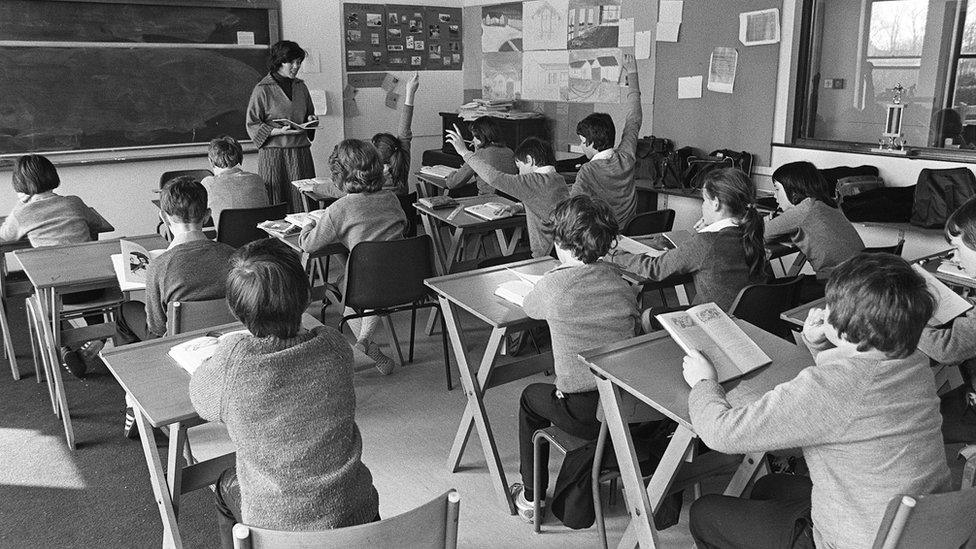Election 2019: Digging into NI parties' manifestos
- Published
The five main Northern Ireland parties have all published their manifestos ahead of Thursday's general election.
They include pledges the parties are making on Brexit, restoring the Northern Ireland Assembly and devolved areas like health and education.
But they also contain some more eye-catching proposals in areas that are reserved for Westminster, but that the parties would like to see changing.
BBC News NI has taken a more detailed look at some of those commitments.
Democratic Unionist Party (DUP)

The DUP is interested in connecting Northern Ireland to power generated by Iceland's volcanoes
Iceland energy link?
The party's manifesto contains a proposal for an electricity hook-up between Northern Ireland and Iceland.
This would involve a 1,000-km long interconnector across the North Atlantic that would see geothermal energy harnessed from Iceland's magma lakes and used to supply the UK and Europe.
It appears to be the first time the DUP has signalled support for the idea, which The Guardian reported, external in 2017.
But while the so-called Icelink has been on the table for years, but there has never been a suggestion the cable should make landfall in Northern Ireland, says BBC News NI Economics and Business Editor John Campbell.
According to Iceland's national power company, external, Landsvirkjun, it would be "technically possible but not a profitable endeavour" to connect Iceland's energy grid with Scotland's.
Other feasibility studies are still being carried out, but it's not clear how much the plan could potentially cost in total, if it got the green light from both the UK and Iceland.
The National Grid says the plan is currently in development.
The interconnector is designated as an EU Project of Common Interest, meaning it could be fast-tracked and attract funding, adds our correspondent.
Restore free TV licences for over-75s

The DUP's manifesto restates a previous position that TV licences should be abolished.
While they still exist, all those aged over 75 should get licences for free, the party argues - a clear attempt to win over some of the older electorate.
Both the SDLP and UUP also want to see the free licence fees for over-75s. Sinn Féin and Alliance both criticised the decision to no longer offer free licenses to all over-75s but neither manifesto mentions the party's approach to licensing in the future.
In 2015, the government announced the BBC would take over the cost of providing free licences for over-75s by 2020, as part of the fee settlement.
But in June, the BBC said it could not fund all the licences, which would have cost £745m, a fifth of the broadcaster's budget, by 2021-22.
Instead only low-income households (in which one person receives the pension credit benefit) will still be eligible for a free licence. This will cost about £250m, depending on take-up.
The DUP argues additional money should be found to allow over-75s to be exempt from payment - but neither the BBC nor an incoming government would want to take on the extra cost.

Sinn Féin
Implement an Irish Language Act in Northern Ireland
A long-time policy commitment, this is one of the party's red lines for returning to the power-sharing government at Stormont.
No details of what the act would contain have ever been published, but in 2015 Sinn Féin's Culture Minister Carál Ní Chuilín launched a consultation on proposals for an Irish Language Bill.
Proposals included:
Irish being defined as an official language in Northern Ireland
Irish being given legal status to be spoken in courts and in the assembly
All state organisations would have to publish documents in both Irish and English and provision should be made for bilingual road signs
In 2017 the Irish language group Conradh na Gaeilge said introducing an Irish language act would cost an initial £8.5m. Some unionists say it would cost much more.
Unionist parties continue to oppose Irish language proposals, saying they are a waste of money and are being pursued as part of a wider political agenda.
Because of the way power-sharing at Stormont works, unionists would need to agree to an Irish Language Act in order for it to become law.
Talks to restore devolved government collapsed in February 2018 after the DUP and Sinn Féin failed to come to agreement on the issue.
But there had been speculation that the DUP was prepared to sign up to three separate bills dealing with Irish, Ulster Scots and other cultural matters.
While this ultimately came to nothing, it suggests there may be some way forward for an Irish Language Act.

Graffiti in Belfast calling for an Irish language act
Push the Irish government to form a committee on Irish unity
Sinn Féin has been consistent in saying there must be a referendum on Irish unification in the event of a no-deal Brexit.
Deal or no deal, the party wants a poll sooner rather than later and has called on the Irish government to prepare for this.
But Taoiseach (Irish Prime Minister) Leo Varadkar has said a vote on Irish unity in the wake of a no-deal Brexit would be divisive and "not the right way forward.
His deputy, Simon Coveney, said calls for a border poll during Brexit negotiations were "unhelpful".
It seems unlikely either man will change their position in the months after the UK leaves the EU, which is currently scheduled for 31 January.
But with a general election looming in the Republic of Ireland as well, might things be different under a new government?
The leader of the opposition, Micheál Martin, said earlier this year: "Brexit cannot be used as a battering ram for unity."
That will not stop Sinn Féin making the case for progress on Irish unity, and if they were to form part of the next Irish government that would change the dynamics completely.
Alliance Party
Universal basic income
The party wants a royal commission or panel of experts to review the UK welfare system - including a trial of a Universal Basic Income (UBI) for Northern Ireland.
Various proposals have been made for a basic income in the UK, including a report this year from SOAS Professor Guy Standing suggesting every adult should receive £48 a week.
UBI would mean everyone gets a set monthly income, regardless of means, which would be funded by scrapping more than 1,000 tax reliefs.
In theory, it would ultimately save money by lifting people out of poverty and improving their health and wellbeing, while also removing the stigma of receiving benefits.
Critics say it would:
Remove incentives for people to work
Cost too much
Not be beneficial to those who need more support, such as disabled people
"A scoping exercise to look at UBI is not much of a commitment," says John Campbell. "Maybe such an exercise would conclude UBI could be piloted in NI or somewhere else, maybe it wouldn't."
Integrated education
Integrated education has long been a key policy of the Alliance Party. In Northern Ireland, most children are educated separately according to their religion or community background.
Integrated schools educate children from Protestant and Catholic backgrounds together, along with children from other faiths and none.
Currently only about 7% of children attend an integrated school, but Alliance is committed to increasing the number of places available.
Proponents of integrated schools argue that one of the barriers to more children being educated in this way is the lack of places, rather than a lack of demand.
But there are still many parents who do not want their children to attend an integrated school, while the Catholic Church in particular is keen to keep its role in running schools.
Alliance, however, says its policy is not to abolish all other forms of education, but rather to ensure as many children as possible have the option of integrated schooling.
It says the policy would be self-financing, through the rationalising of the school estate.

Lagan College was Northern Ireland's first integrated school when it opened in 1981
SDLP
Wider access to IVF treatment
Difficulty conceiving can be a traumatic experience for couples and private IVF treatment can be extremely expensive.
In Northern Ireland, one fresh and one frozen embryo transfer are provided on the health service for women under the age of 40 who have a proven medical cause of infertility and who have had no more than three previous unsuccessful transfers.
The SDLP says it would increase this entitlement to three IVF cycles, as is the case in Scotland.
The changes in Scotland came into force in March 2017 at an estimated cost to the NHS of £1m a year.
While this may not be a huge sum of money, there are already huge funding challenges facing the health service in Northern Ireland.
Politically, there is little to suggest other parties would oppose the move, but the money would need to be found somehow.

IVF can be extremely expensive
New social housing
It has pledged to build 3,000 new social homes each year.
John Campbell says that as housing is a fully devolved issue, to build any additional homes would require:
A functioning devolved administration
Consensus in the administration that additional capital spending on housing is a priority
Sufficient funding via the block grant
Building homes can end up being more difficult to implement than it first sounds.
Earlier this year the research group Capital Economics, on behalf of housing charity Shelter, estimated that building 3m new social homes in England in the next 20 years would cost about £10.7bn a year.
Based on those figures, it would cost about £200m a year to build 3,000 homes each year in Northern Ireland.
While these figures are not directly comparable, they do give some idea of the potential challenges for such a policy.
UUP
Plant a million new trees by 2025


At 8%, Northern Ireland is the least wooded part of the UK and one of the least wooded areas in Europe.
Northern Ireland has a target of doubling tree cover from 6% in 2006 to 12% in 2050, but planting rates mean we're well off the mark.
In order to hit targets, we'd need to be planting about 1,600 hectares a year, compared to current levels of around 200 hectares, he adds.
The UUP's million-tree pledge would equate to about 100 hectares a year between now and 2025.
Environmentalists say the tree planting targets and the incentives for landowners need to be completely overhauled.

Introduce new concessionary VAT rate of 9% for the hospitality sector
This policy is designed to make Northern Ireland's hospitality sector more competitive compared to its counterpart in the Republic of Ireland.
While the standard VAT rate in Northern Ireland - along with the rest of the UK - is 20%, in the Republic of Ireland it is 13.5%.
It was raised back to that level in January, having previously been slashed to 9% in 2012 in an attempt to stimulate the tourism industry.
The country's finance minister, Paschal Donohoe, was told by officials that increasing the rate would have a minimal impact on members of the public, but many in the hospitality industry claimed the cut boosted both employment and business.
The Irish government estimated it would raise €466m (£394m) a year through the change.
The issue has been raised before, but in 2015 then Treasury Minister David Gauke said it was not possible to reduce VAT in Northern Ireland because of EU VAT law.
Of course, if the UK leaves the EU, then that would no longer apply.
House of Commons committees have subsequently looked at the issue, and if Britain leaves the EU as planned, expect the UUP to ask the government to examine the issue once again.
But a consultation launched by then Chancellor Philip Hammond in March 2018 found that similar VAT cuts in Finland and Sweden had a limited to modest impact, while in France it boosted employment but had little effect on prices, so a future government may not be keen to explore the issue further.